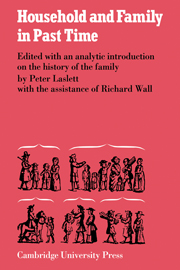Book contents
- Frontmatter
- Contents
- List of contributors
- Preface to the first impression
- Preface to the second impression
- 1 Introduction: The history of the family
- 2 Some demographic determinants of average household size: An analytic approach
- 3 The evolution of the family
- ENGLAND
- WESTERN EUROPE
- SERBIA
- 14 The zadruga as process
- 15 Houseful and household in an eighteenth-century Balkan city. A tabular analysis of the listing of the Serbian sector of Belgrade in 1733–4
- 16 Town and countryside in Serbia in the nineteenth-century, social and household structure as reflected in the census of 1863
- JAPAN
- NORTH AMERICA
- Bibliography
- Index
14 - The zadruga as process
Published online by Cambridge University Press: 02 November 2009
- Frontmatter
- Contents
- List of contributors
- Preface to the first impression
- Preface to the second impression
- 1 Introduction: The history of the family
- 2 Some demographic determinants of average household size: An analytic approach
- 3 The evolution of the family
- ENGLAND
- WESTERN EUROPE
- SERBIA
- 14 The zadruga as process
- 15 Houseful and household in an eighteenth-century Balkan city. A tabular analysis of the listing of the Serbian sector of Belgrade in 1733–4
- 16 Town and countryside in Serbia in the nineteenth-century, social and household structure as reflected in the census of 1863
- JAPAN
- NORTH AMERICA
- Bibliography
- Index
Summary
INTRODUCTION
The large and complex households reported from the Balkans have excited scholarly attention for many years; to intellectuals who were themselves living in an urban–industrial environment and in conjugal units that seldom contained any added relatives other than an unwelcome mother-in-law, households reputed to have up to a hundred members demanded explanation. Such explanations have taken a variety of forms: historical, evolutionist, functional, psychological, economic, legalist. Most of them have had implicit or explicit political or ideological intent, or have at least had such intent attributed to them. They may regard the complex household as a survival of a more primitive state common to many people, or typical of ‘retarded’ development, or as a retention of alleged Slavic tendencies to peaceful cooperation in contrast to Germanic individuality and aggressiveness. They may suggest social conditions that stimulated its growth: the need for a body of coresident males for defense in frontier situations, the existence of a hearth tax or similar dues that made group living more economical, the advantages to household economy in a finer division of labor – or those that led to its decline: the introduction of private property and of a money economy that stimulated individuality and the division of extended households. Some discussions even attribute variation in the form of the complex household to invidious differences in national character.
With a few notable exceptions, discussions of these households have focused on legal, economic, and political aspects.
- Type
- Chapter
- Information
- Household and Family in Past Times , pp. 335 - 374Publisher: Cambridge University PressPrint publication year: 1972
- 39
- Cited by



